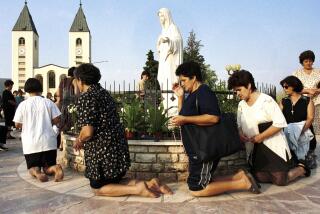Call for Civil Laws Alarms Experts : Artificial Birth Stand by Vatican Criticized
- Share via
Medical ethicists and physicians expressed doubt Tuesdaythat the Vatican document opposing means of human procreation woulddeter many American Catholic couples who otherwise would be unable tohave children.
Some ethicists also said they were alarmed at the Vatican’s call for the enactment of civil laws to ban such techniques as artificial insemination, embryo and sperm banks, surrogate parenthood and “test-tube babies.”
But the 40-page document--which condemned nearly all the recent advances in reproductive medicine--was welcomed by Roman Catholic church leaders.
“Having a baby at all costs isn’t always the greatest good,” Los Angeles Archbishop Roger Mahony said.
At a news conference in Los Angeles, he said that in certain instances “informed couples who deliberately disregarded the guidelines could be considered to be involved in ‘sin against God.’ ” But that doesn’t mean that those children born as a result of artificial reproduction would not be allowed to be baptized, Mahony said.
“Human reproduction should be in the context of marital love, of family love,” said the Most Rev. Norman F. McFarland, bishop of the Diocese of Orange. “Surrogate motherhood has caused many problems. Just look at the (celebrated “Baby M”) case in New Jersey. Who are the parents? Whose baby is it? There are all kinds of problems. Just because something can be done doesn’t mean it should be done or that it’s in accordance with Divine Will.
“We should not go to the labs to make babies,” McFarland added.
Condemnation Regretted
Although some Protestant ethicists regretted the condemnation of any technique that does not involve natural procreation, they said they think that the document may prod non-Catholic religious bodies to articulate their own positions.
“At least the Roman Catholic Church, by issuing this statement, is challenging other churches to take up the same issue. (Most church members) are not looking to church leaders at all for guidance but tend to read the secular literature and make up their own minds,” according to a leading Protestant ethicist, J. Robert Nelson, director of the Institute of Religion at the Texas Medical Center in Houston.
Dr. Jaroslav Marik, director of Pyler Medical Clinic in Westwood, which diagnoses and treats cases of infertility, said he was surprised by how strongly the condemnations were stated.
“The tendency to want children is so strong that people will disregard this ruling,” Marik said.
Disagree With Vatican
Surveys have indicated that most Catholic married couples in America disagree with the Vatican’s opposition to the use of artificial birth control methods, noted Helen Kelley, executive director of the new Josephson Institute for the Advancement of Ethics in Los Angeles.
“The official pronouncement may give them pause to think, but I don’t think it’s going to change anybody’s mind,” said Kelley, former president of Immaculate Heart College in Hollywood.
The document, issued Tuesday by the Congregation for the Doctrine of the Faith, said public officials had a duty to see that “civil law is regulated according to the fundamental norms of the moral law.”
Kelley asked rhetorically, “Can we ever have Catholics running for high political office again in this country without being forced to deal with questions about church efforts to make civil law match moral law?”
‘Disappointed, Not Surprised’
The statement was also criticized by Susan M. Wolf of the Hasting Center, an ethics institute at Hastings-on-the-Hudson, N.Y. She called the statement “a lone voice crying in the wilderness” because it rejects not only controversial reproduction techniques that involve a third party but also more widely accepted methods that involve only a husband and wife.
An evangelical Protestant ethicist, Allen Verhey of Hope College in Grand Rapids, Mich., said he is “disappointed but not surprised” by the Vatican pronouncement.
“Many Protestants have sympathy for the idea of not divorcing the sexual act from the covenant of marriage and procreation,” Verhey said. “But neither love-making nor baby-making should be elevated to a purely spiritual thing.”
Times staff writer Bill Billiter contributed to this story.
More to Read
Sign up for Essential California
The most important California stories and recommendations in your inbox every morning.
You may occasionally receive promotional content from the Los Angeles Times.













